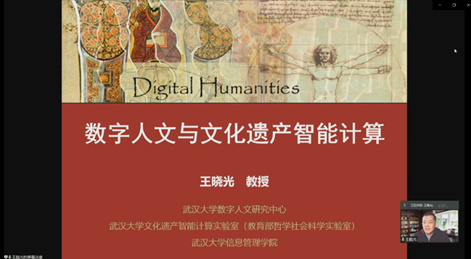On the afternoon of April 30, Xiaoguang Wang, Professor and Associate Dean of the SIM,Wuhan University, was invited to be a guest speaker at Xinhuanet, and gave a virtually keynote report entitled Intelligent Computing of Digital Humanities and Cultural Heritage for the digital humanities topic of China GLAM Open Class.

In Xiaoguang Wang's report, he introduced the era background, historical origin, concept connotation, research contents, methods and tools of digital humanities, and combined with domestic and foreign digital humanities organizations and their practical cases, he explained the basic goal and realization logic of intelligent computing of cultural heritage. The report systematically analyzed the thought and path of "activate" utilization of cultural heritage in the digital humanistic environment, introduced the research idea and positioning of the Wuhan University's Intelligent Computing of Cultural Heritage, Philosophy and Social Sciences Laboratory of the Ministry of Education. Xiaoguang Wang sincerely invites scholars and cultural heritage institutions to cooperate to realize the continuation of Chinese excellent traditional culture in digital space.
This report has been eagerly anticipated and widely concerned by public audience. During the preview period of the report, the attention of the report poster at Xinhuanet reached 404,000 person-times, and the online booking number of the Xinhua Cloud Live platform was nearly 13,000. The two-hour report attracted a total of 784,000 visitors from domestic and foreign libraries, museums, archives, cultural centers and other public cultural service fields, as well as universities.

China GLAM Open Class is jointly sponsored by Xinhuanet, Shanghai University and Nanjing University of the Arts, and organized by GLAM of Shanghai University and School of International Museum, Nanjing University of the Arts. China GLAM Open Class was originally China Museum Open Class, and now it has expanded from the museum field to a wider range of social, historical, cultural and artistic fields carried by public cultural spaces such as gallery, library, archives, and museum ("GLAM"), and has become a public cultural brand with important influence inside and outside the industry. This report was the second keynote report on digital humanities, and it has received enthusiastic feedback from the audience.